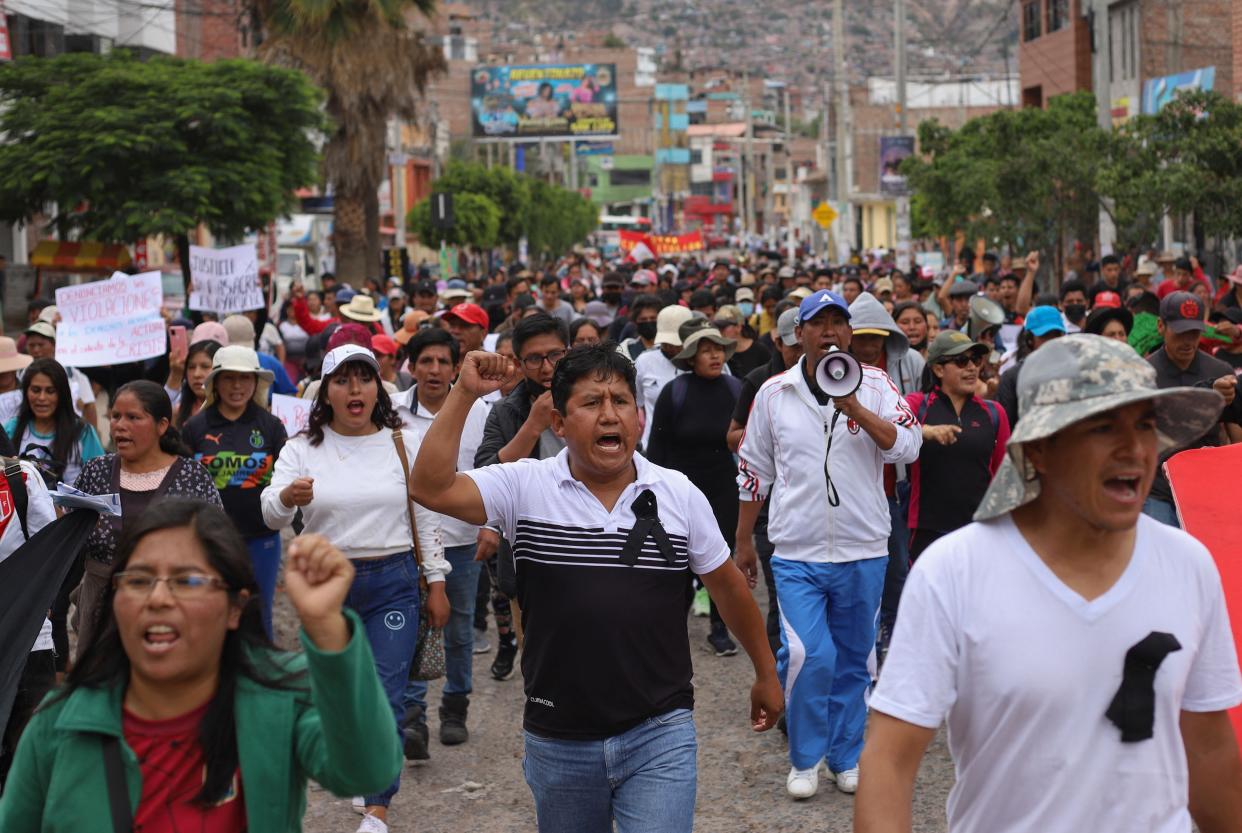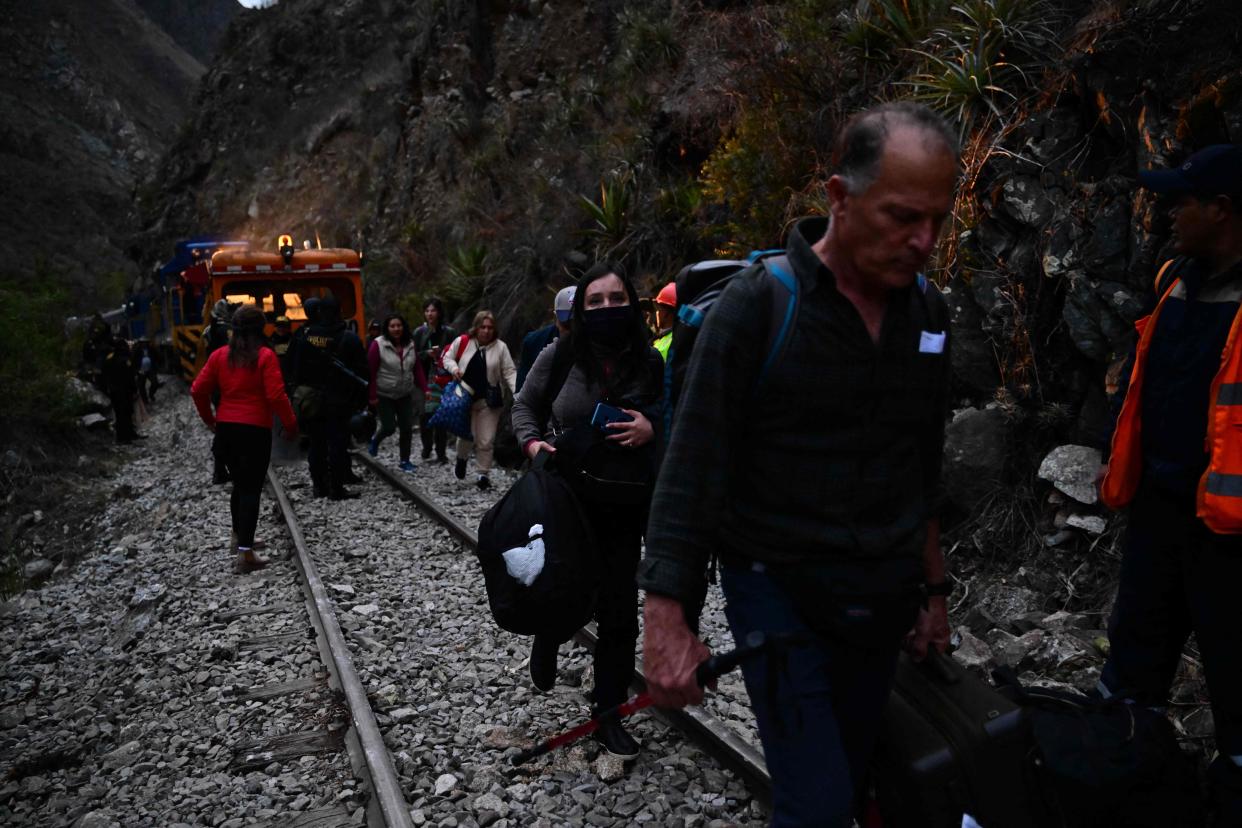Deadly unrest leaves American tourists stranded in Machu Picchu
Deadly unrest in the wake of a political crisis has left a number of American tourists stranded in Peru.
Hundreds of international travelers, including some Americans, were stuck in and around the historic city of Machu Picchu as the government raced to secure transport to the nearest airport this weekend. Photos and eyewitness accounts suggested protesters had placed rocks on train tracks leading to the Inca citadel.
Solo traveler Brian Vega, a Miami-Dade Fire Rescue Capt., told NBC News he had been visiting the ancient mountainous town but found himself stuck when the train lines to the airport were shut.
“We’re isolated here,” he said. “The only way in is via train or the other case would be a helicopter.” Vega added that he was considering hiking to the nearest town to access the airport.
Peru declared a 30-day national emergency on Wednesday after violent protests erupted following the ousting and detention of President Pedro Castillo, who had sought to dissolve parliament in a last-minute power grab.
The declaration “means the suspension of the rights of assembly… freedom of movement,” Defense Minister Luis Otarola announced on Wednesday, suspending the rights of the people to gather and move freely across the Andean country. An overnight curfew was also in place across major cities.
Peru’s caretaker president, Dina Boluarte, exhorted Congress on Saturday to approve early elections that could provide a way out of the crisis.
At least 20 people have died, and more than 500 demonstrators and security forces have been injured in the unrest, according to the Associated Press.
Many highways are blocked and train services have been suspended, leaving a number of tourists stranded for days at Machu Picchu with no transport from the UNESCO World Heritage site to an international airport almost 50 miles away in Cusco.
Colorado resident Tom Gray’s group had managed to take the last bus back to Aguas Calientes, the gateway town to the citadel, he told NBC News in a video interview.
He said that there were dozens still stuck at the top.
“Our guide had to bribe the protesters to move the rocks to let us go back to our hotel,” said Gray, who had first arrived at Machu Picchu on Monday night. Their group had to navigate through at least 18 roadblocks constructed by trees and boulders, he added, which were guarded by local villagers.
“There was like 200 of us rather than 5000, which is the normal population,” of the site, said Gray, adding, “we had the whole place to ourselves.”
“That was big time silver lining everywhere in being stuck here,” said Gray.
All trains to and from Machu Picchu had been halted on Tuesday, PeruRail said in a statement posted on Facebook.
“The Government of Peru is organizing an evacuation via four helicopters of the most vulnerable foreign tourists from Aguas Calientes/ Machu Picchu Village,” the U.S. Embassy in Lima said Saturday in a statement.
“The Peruvian government has informed the U.S. Embassy that plans are in progress to assist all travelers in Aguas Calientes/Machu Picchu Village with departure,” it added.
Almost 400 tourists from Machu Picchu were accompanied by the tourism police to Ollantaytambo district, northwest of Cusco, and then transported to the airport by bus, the ministry said in a tweet on Sunday.
On Saturday, the ministry said it was planning to “facilitate humanitarian flights,” prioritizing the elderly and vulnerable people.
The violent unrest has prompted advisories from the U.S. State Department recommending citizens “reconsider travel” to the country, and similar guidance from other countries including the U.K. and Spain.
Following the advisories, Daniels and McLaughlin booked their flights out of Lima for Sunday evening and Gray reserved his for Tuesday. “We can get to Cusco airport, that airport is open which would transport us to Lima,” Daniels told NBC News, adding she would make her way once trains resumed.
“We miss our families though; we would like to get home. Our kids are all flying in to be with us for Christmas and they might have it without us,” said McLaughlin.
Source: Read Full Article




